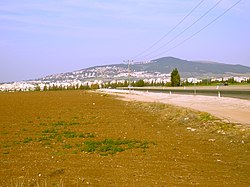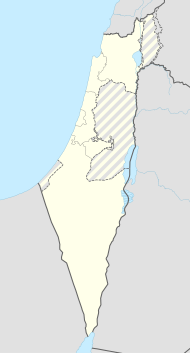Afula
| Afula | ||
|---|---|---|
|
||

|
||
| Basic data | ||
| hebrew : | עפולה | |
| arabic : | العفولة | |
| State : |
|
|
| District : | North | |
| Founded : | 1925 | |
| Coordinates : | 32 ° 36 ' N , 35 ° 17' E | |
| Height : | 60 m | |
| Area : | 26.909 km² | |
| Residents : | 51,737 (as of 2018) | |
| Population density : | 1,923 inhabitants per km² | |
| Community code : | 7700 | |
| Time zone : | UTC + 2 | |
| Postal code : | 18105 | |
| Community type: | City administration | |
| Mayor : | Yitzhak Meron | |
| Website : | ||
|
|
||
Afula ( Hebrew עפולה, Arabic العفولة, DMG al-ʿAfūla ) is a city in Israel .
geography
location
Afula is a city government in the northern district of Israel. It lies between Nazareth and Jenin in the Jezreel plain . It is also often referred to as the capital of the Jezreel plain. The main attraction in the area is Mount Tabor .
Residents
The Israeli Central Statistical Office gives the following population figures for Afula in the censuses of November 8, 1948, May 22, 1961, May 19, 1972, June 4, 1983, November 4, 1995 and December 28, 2008:
| Year of the census | 1948 | 1961 | 1972 | 1983 | 1995 | 2008 | 2016 |
| Number of inhabitants | 2,504 | 13,844 | 17.307 | 21,277 | 33,557 | 39,652 | 47.014 |
history
Middle Ages and Modern Times
Afula is not mentioned in the Bible. A castle was built here in the days of the Crusaders to protect an important intersection of the plain. The crusaders called the place La Fève . Remains of the crusader castle are in the nearby kibbutz Merchawia . In 1321 the place was mentioned as Afel by Marino Sanudo in his opus Terrae Sanctae .
20th century
A Jewish settlement was established on March 31, 1925. American Zion Commonwealth Ltd., which had acquired the land of the village, commissioned Richard Kauffmann to draw up a development plan for its expansion into a city. Kauffmann took Afula's central location on traffic routes and close to productive agriculture in the Jezreel plain as the starting point to develop it as a location for central services for agriculture (agricultural machinery trade, mills, silos, agricultural processing). The plots of land marked out according to his plans were sold in 1925/1926 to well-meaning investors in North America, who mostly did not build or develop, but initially only held the land - also because of the Great Depression . Kauffmann's spatial plan for Afula only slowly began to take shape between 1938 and 1940.
The establishment of the State of Israel brought Afula the status of a developing city . The state then expropriated the American owners of the vacant lots for their own development, but Afula did not become what Kauffmann and others originally expected. The new peripheral location with cut-off traffic routes, into which Afula had gotten through the armistice line of 1948/1949, robbed him of his geographical advantage and the kibbutzim and moschavim on the Jezreel plain had long since created their own facilities for the central services they needed. The road to Jerusalem was interrupted and rail traffic, which now ended at the border with Syria , was stopped in 1951 because operations on the remainder of the route no longer paid off.
21st century
On November 27, 2001, two Palestinian assassins from Jenin killed two Israelis and injured more than 50, some seriously , in Afula when they were shooting at random with machine guns in the city's market square.
On March 5, 2002, a Palestinian suicide bomber set off a bomb in a public bus. One Israeli was killed and at least 17 others wounded.
In June 2018, hundreds of Jewish-Israeli residents of Afula demonstrated against the sale of a house to a Palestinian-Israeli family. "The traitors to the Jews will find no rest," read a banner. (This meant the Jewish sellers of the house.) Avi Elkabetz (the former mayor of Afula) and Shlomo Malihi (deputy mayor of Afula) took part in the protests. Elkabetz said: “The residents of Afula do not want a mixed city, they want a Jewish town and that is their right, that is not racism.” Malihi said: “I hope that this sale will be canceled so that Afula will not be a mixed city becomes. We don't have admission committees like the cities and kibbutzim in the area, but we will not allow the character of the city to change. "Palestinian-Israeli Knesset MP Ayman Odeh said of the protests:" There is no small cause for concern how the hatred and racism incited by the government is making our hopes for coexistence wan. "Palestinian-Israeli Knesset MP Yousef Jabareen said," Racism and ethnic superiority have been legitimized under this right-wing government. This protest was supposed to shake the political system and keep those who stand up for equality and human dignity awake. ”(In surveys, half of all Jewish Israelis stated that they do not want Arabs as neighbors.) The American writer and civil rights activist Shaun King wrote about the events in Afula: “White racists have surrounded the house and are chanting that they only want white Jews in the neighborhood, and the local government is now planning to reverse the sale. Most worrying. "
In the summer of 2019, the city closed its city park ⊙ to people from outside the city. This aroused the accusation of racism, since the measure primarily affects Arabs, since the city is almost exclusively inhabited by Jews, but many Arabs live in the surrounding area. The measure was prohibited by a court, although the court did not respond to the allegation of racism, as the blocking of public facilities was fundamentally incompatible with Israeli law.
traffic
The Arab village of Afule received a train station as part of the construction of the old Jezreel Valley Railway , a branch of the Hejaz Railway . The line went into operation in this section in 1904 and was closed in 1951. The Samariabahn was built from here to the south, the first section of which opened in 1912. It went out of service in 1946. Since 2016, Afula has been connected to the Rakkevet Israel railway network again with the New Jezreel Valley Railway .
sons and daughters of the town
- Rafael Eitan (1929–2004), general and member of the Knesset
- Avischai Margalit (* 1939), philosopher
- Danny Atar (* 1958), politician
- Yael Bartana (* 1970), artist
Town twinning
Afula itself only lists three twin cities :
Web links
Individual evidence
- ↑ אוכלוסייה ביישובים 2018 (population of the settlements 2018). (XLSX; 0.13 MB) Israel Central Bureau of Statistics , August 25, 2019, accessed May 11, 2020 .
- ^ Israel Central Bureau of Statistics
- ^ Mordecai Naor: Eretz Israel , Könemann, Cologne, 1998, ISBN 3-89508-594-4 , p. 133
- ↑ a b c d e Lotte Cohn : Richard Kauffmann: Architect and City Planner [Richard Kauffmann: Architect and Urban Planner (German), Jerusalem: Letter to Bath-Scheva Kauffmann, 1978; Engl.], Monika Iacovacci (ex.). Richard Kauffmann: Architect and Town Planner - Biography . Retrieved October 28, 2012.
- ↑ Zinni: Sharon also has to deal with settlement construction In: Israelnetz.de , November 28, 2001, accessed on July 30, 2018.
- ^ Three more attacks - tremors in Israel. In: Israelnetz .de. March 5, 2002, accessed July 26, 2019 .
- ↑ Noah Shpigel: Hundreds of Israelis Demonstrate Against Home Sale to Arab Family. In: Haaretz , June 14, 2018; ders .: Dozens of Israelis Demonstrate Against Home Sale to Arab Family for Second Straight Day. In: Haaretz , June 14, 2018; Bethan McKernan: Israeli town residents take to streets in hundreds to protest sale of house to Arabs , Independent , June 14, 2018; Tsafi Saar: The Israelis Who Protested Against a Home Sale to Arabs Aren't Alone. They Have Friends in the Left. In: Haaretz , June 17, 2018; Ignoring Racism in Afula Haaretz , June 18, 2018; Suhad Bishara: When racism and segregation are perceived as' legitimate rights +972 , June 21, 2018.
- ↑ Lihi Yona: The color of racism: What many get wrong about race relations in Israel +972 , June 24, 2018.
- ↑ Mensenrechteorganisaties waarschuwen voor nieuwe apartheid in Israël. In: hln.be . Retrieved July 14, 2019 (Dutch).
- ↑ Afula Reverses Position on Municipal Park, Will Welcome Arabs. In: The Jewish Press . Retrieved July 14, 2019 .
- ↑ ערים תאומות - עיריית עפולה. Archived from the original on January 12, 2015. Retrieved January 25, 2015.
- ^ Miasta partnerskie - Biłgoraj . Retrieved January 25, 2015.
- ^ Afula-Gilboa, Israel (1979) - New Haven Sister Cities . Archived from the original on February 20, 2015. Retrieved January 25, 2015.
- ↑ Ciudades Hermanadas - Santa Fe Ciudad . Retrieved January 25, 2015.



